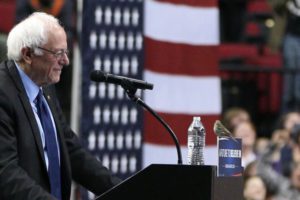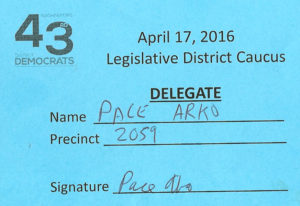This started off on Sunday the 17th of March, after my attendance, as a Bernie Sanders delegate, of the 43rd Legislative District Caucus of the Democratic Party. This meeting was to accomplish many things, the chief of which was the election of delegates who’d then move onto county, congressional district and state party caucuses and conventions and then finally be sent on to the National Party Convention in Philadelphia in late July.
“Caucusing is Weird”
At the meeting there were the usual complaints by some new to Washington State’s Democratic Party caucus system. Voting by caucus is slow, complicated and–perhaps–inefficient in comparison to the standard primary voting schemes of most states.
Going on my own memory, from the mid 1980s until at least 2004, several have tried in presidential election years to move Washington State to a Party affiliated primary system. Continuing to go on my memory of the last 30 years of news, this was most angrily rejected and fought against by the state’s Democratic Party.
The state Republicans the idea to change to a primary system. This mostly dates back to 1988, when Christian conservative voters used the Washington caucusing system to stage a takeover of the state GOP. This scared and embarrassed the GOP leadership so they’ve been holding to a primary system ever since.
These different reactions have a lot to do with the history and ideology of both parties in the state. To really explain all would divert us but, to summarize without much evidence, Democrats like the system because:
- It serves as a grass roots fund raising method
- It serves as outreach and recruitment for unaffiliated voters
- It’s a networking system that sends roots into communities
- It gets Party members involved with party workings including changing ideological planks.
- It forces voters to choose and at least temporarily join a party.
Republicans don’t like it, at least as an election method, because
- There is the risk that rank and file members can use the system go against party leadership
- It’s more party neutral (Which I’d say is code for “independents” who frequently vote GOP anyway.)
- It’s slow, expensive and overloaded with tasks. Primaries are more optimized to doing one thing: electing people.
But to sum up what happened last Sunday, our caucus meeting was well organized despite the huge turnout. Our chair, James Apa, worked hard to explain things, resolve confusion, make party procedure transparent to the questions of new members and still keep things rolling along in an efficient matter.
Are there problems with caucus systems? Yes. Are there benefits to caucus systems? Yes.
Argh! Where to Start?
 But while we’re on the subject of election system reform, I’d say there are many things that are more weird, broken and just plain corrupt about how elections work in the US. The Electoral College has got to go. We need to move to a Single Transferable Vote system. Gerrymandering still runs rampant. Corporate lobbyists warp state legislatures, the door continues to revolve and money needs to be kicked out of politics.
But while we’re on the subject of election system reform, I’d say there are many things that are more weird, broken and just plain corrupt about how elections work in the US. The Electoral College has got to go. We need to move to a Single Transferable Vote system. Gerrymandering still runs rampant. Corporate lobbyists warp state legislatures, the door continues to revolve and money needs to be kicked out of politics.
With each and every one of those problems, the entrenched powers that be will fight reform until the bitter end. As always, reform will be hobbled with intentionally broken compromises and the irrelevancies of the public’s short attention span. Representative politics have been contending with corruption and reform since Solon’s day. But I think we’ve reached another turning point in United States history, this is how I interpret the meaning of Bernie Sanders’ rise to national prominence.
It’s About Sending a Message

The first time I heard “Love Me, I’m a Liberal” back in the 1980s, Phil Ochs stuck as a very insightful critics of the American Left.
There is no doubt in my mind that Hillary Clinton is one of the most able, trained and experienced presidential candidates my party has put forward in 30 years. She’s tough under fire. Perhaps she’s not especially charismatic but she’s smart and visionary. National health care reform was pretty much her brainchild. And as someone who has long considered himself a feminist, it’s about damn time we had a woman as president! After New York, it’s clear now she’ll be the Party’s nominee for president. And she’ll have my vote and full support with no hard feelings. She’s earned it.
So why did I support Sanders? And why do I ask all Sanders delegates to remain steadfast all the way to the national convention in Philadelphia? It’s about ideology.
In his long career in Congress, Sanders has been an independent. My theory is he did this simply because the Democratic Party in the United States was not left-wing enough for him. This was especially true during the last 40 years as the apathy, fear and cynicism of the 1970s signaled a shift to the right-wing, peaking with the election of Ronald Reagan in 1980.
But 40 years is a long time. I feel the coalition built between neoliberal economics and religious conservatives back in the 1970s has disintegrated and has become irrelevant in the face of the global financial meltdown and the open xenophobia of Donald Trump.
Things have come full circle again. Deregulation has broken both the banking system and the stock markets. And international trade, while beneficial in many ways, also exploits the lack of international law, the slave wages and lack of environmental regulations in poor countries and saps jobs away from postindustrial ones The Soviet Union is gone and terrorism just isn’t scary enough to cow people into voting for you. Meanwhile our infrastructure continues to crumble and income disparity is at an all time high. The world is a very different place than it was 1976.
 It’s into this world that Bernie Sanders set foot when he declared as a Democratic presidential candidate. As an independent, this was a very clever move on his part as the election system on the local, state and federal level is strongly stacked against independent and third party candidates.
It’s into this world that Bernie Sanders set foot when he declared as a Democratic presidential candidate. As an independent, this was a very clever move on his part as the election system on the local, state and federal level is strongly stacked against independent and third party candidates.
He’s made an astoundingly good run so far in defying the talking heads. He’s inspired a lot of people who wouldn’t have gotten involved in this election if he wasn’t there to represent their views, so long scoffed at and ignored in this country.
All the Sanders supporters–especially all the new ones we may gather after New York–have a mission: Even if Sanders won’t win, they need to push the Democratic Party back to the left. A sufficient portion of the public is ready for it. That’s been my reason for support Sanders from the start. I wasn’t too sure on his success but I did want to sent a message to the moderates in the Party establishment–the country is ready for a return to the left. You know, the real left.


An interesting addendum to the primary election in New York on the 19th. There were a lot of mistakes made that excluded a lot of voters–who likely would have voted for Sanders:
http://www.youtube.com/watch?v=TOmYw8H-wFg